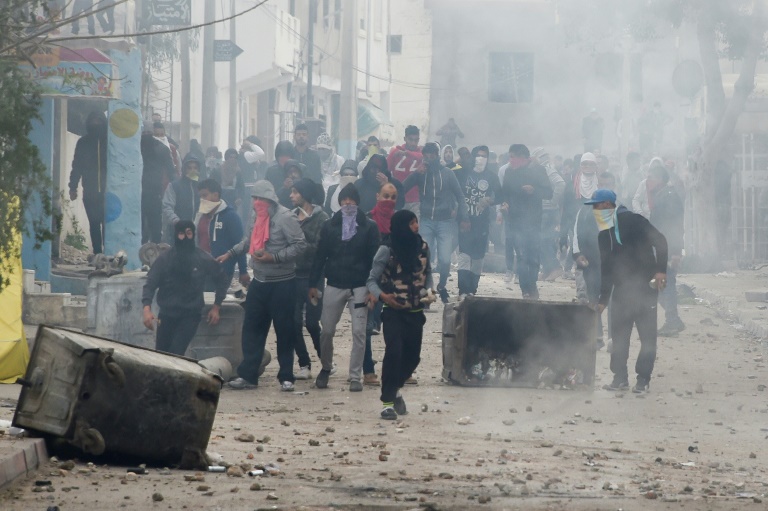It's been seven years since they ousted their longtime dictator in the first of the Arab Spring uprisings, but Tunisians are still taking to the streets.
Why, after so long, has the country been unable to tackle its economic problems?
Unemployment, corruption and austerity measures in the 2018 budget have fuelled widespread protests as the North African country marked the anniversary of the 2011 revolt that toppled longtime dictator Zine El Abidine Ben Ali.
While Tunisia has been praised as a model of democratic transition, post-revolution governments have struggled to improve living standards and tackle pervasive graft.
Why the new protests?
“Work, bread and national dignity” — that was the slogan that rallied Tunisian protestors in 2011.
But a growth rate that reached a moderate two percent in 2017 following years of stagnation, has barely dented the unemployment figures, which remain stubbornly above 15 percent — rising to 30 percent among young graduates.
Political economist Med Dhia Hammami said investments since the revolution have been chanelled to projects that yield profits rather than offer mass employment.
“Most direct foreign investments in Tunisia are in the extractive sector — gas or oil — which doesn’t create jobs,” he said.
“There is a focus on services, including tourism, which create very precarious and seasonal jobs, to the detriment of agriculture, for example.”

Tunisian protesters clash with security forces in the town of Tebourba on January 9, 2018, following the funeral of a man who was killed the previous day in a demonstration over rising costs and government austerity
If things continue as they are, he added, “we will find ourselves, like under Ben Ali, with growth at five percent and unemployment at 15-18 percent.”
Adding to the pain of joblessness, prices grew by six percent in 2017 as the dinar slid against the dollar and new taxes kicked in.
Many analysts expect further inflation this year.
Business executives at a 2016 summit announced investments worth some $37 billion (30 billion euros) — but that has yet to yield tangible results.
Many Tunisians are running out of patience.
Economic reforms since revolution?
Despite legislative delays that have seen bills stuck in parliament for years, there have been “lots of reforms”, said Chafik Ben Rouine, head of the Tunisian Economic Observatory.

Tunisian protestors throw stones towards security forces in the Djebel Lahmer district of Tunis early on January 10, 2018 after price hikes ignited protests
But these were primarily “in response to demands from donors to balance budgets,” he said.
Successive governments since the revolution have launched public sector recruitment drives in order to dampen social unrest.
That, combined with stubbornly low growth, has widened already gaping shortfalls and forced Tunisia to apply for loans from the International Monetary Fund — in exchange for pledges to slash the deficits.
Prime Minister Youssef Chahed has prioritised improving the country’s business climate, pushing for a 2016 investment law that aims to cut red tape.
But many obstacles remain, including the near monopoly held by business tycoons over many sectors of Tunisia’s economy since the 1970s, International Crisis Group analyst Michael Ayari said.
They “use the state to sabotage each other” with red tape, he said.
Chahed’s government in 2017 launched a “war on corruption”, but apart from a wave of high-profile arrests in May, there have been few tangible results.
The passing of a controversial law granting amnesty to officials accused of graft under Ben Ali has cast further doubt on the government’s will or ability to tackle the endemic problem.
What possible solutions?
While state subsidies remain in place for basic goods such as bread and fuel — even for the wealthy — value-added taxes have been a major blow to less well-off households.
The tax system has prompted some to accuse the government of relying on a system of patronage.
“The system of incentives and subsidies should be evaluated and overhauled so that the wealthiest are those who participate most in the effort,” said Mohamed Ali Marouani of the Circle of Arab Economists.
Ayari called for easier access to bank financing, along with better regulation of brokerage firms and other intermediaries to tackle nepotism.
Economist Safouane Ben Aissa, who has worked for several consulting firms since the revolution, advocates an economic modernisation plan.
Instead of bringing in theoretical reforms under pressure from donors, he said, the state should tackle problems such as slow payment times and inefficient social assistance programmes.






